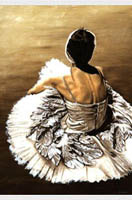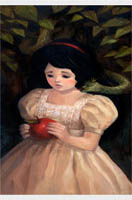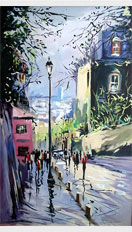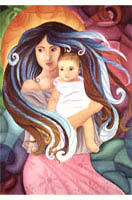John Collier
John Maler Collier (1850–1934) was a British writer and painter in the Pre-Raphaelite style.
Life and career
The artist, the Hon. John Collier OBE RP ROI, was one of the most prominent portrait painters of his generation. He was born in 1850, the son of a judge and amateur artist, Lord Monkswell. He was educated at Eton and studied at the Slade under (Sir) E J Poynter, in Paris under Jean-Paul Laurens, and in Munich. Although not their pupil, he was encouraged and influenced by Sir Lawrence Alma-Tadema and Sir John Everett Millais. "It was from Millais that he learnt the method, which he has ever since adopted in portraiture, of putting sitter and canvas side by side, looking at them from some distance, and walking backwards and forwards to do the actual painting." (Polloch, W H, The Art of the Honourable John Collier (1914), p 2).
Collier was one of the 24 founding members of the Royal Society of Portrait Painters, of which he became Vice President. He was also a member of the Royal Institute of Oil Painters. He exhibited no fewer than 130 paintings at the Royal Academy and 165 at the Royal Society of Portrait Painters, as well as many others in galleries throughout the country and abroad. He was the author of The Primer of Art (1882), A Manual of Oil Painting (1886) and The Art of Portrait Painting (1905). He was awarded the OBE in 1920. He was the subject of The Art of the Honourable John Collier (1914) by W H Pollock, published by the Art Journal, which lists all his most important subjects between 1875 and 1914, whether portraits, or historical or other dramatic scenes. It has 50 illustrations and 6 colour plates of his works, and an interesting photograph of his studio.
Subjects
The range of Collier's portrait subjects can be seen from the fact
that, in 1893 for example, his subjects included the Bishop of Shrewsbury
(Sir Lovelace Stamer), A Glass of Wine with Caesar Borgia, Sir John
Lubbock FRS, A N Hornby (Captain of the Lancashire Eleven), A Witch,
A Tramp, and the Bishop of Hereford (Dr Atlee).
His commissioned portrait of King George V as Master of Trinity House in 1901 when Duke of Cornwall and York, although very far from being his best work, shows the extent of his fashionable reputation.
Other subjects included two Lord Chancellors (the Earl of Selborne in 1882 and the Earl of Halsbury in 1898), the Lord Chief Justice Lord Alverstone (1912), and the Master of the Rolls (Sir George Jessel, 1881); Rudyard Kipling (1891); the painter (Sir) Lawrence Alma-Tadema (1884); the actors J L Toole (1887) and Mrs Kendal, Miss Ellen Terry and Mr Tree (in "The Merry Wives of Windsor", 1904); heads of houses such as the Master of Balliol (Professor Caird, 1904), the Warden of Wadham College, Oxford (G E Thorley, 1889) and the Provost of Eton (1898); the Speaker of the House of Commons (1898, one of relatively few political subjects); soldiers such as Field Marshal Lord Kitchener of Khartoum (1911) and Field Marshall Sir Frederick Haines (1891); two Indian Maharajahs, including the Maharajah of Nepal (1910); and scientists including Charles Darwin (1882), Dr Joule FRS (1882) and the artist’s father-in-law Professor Huxley (1891).
A photocopy of John Collier's Sitters Book (made in 1962 from the original in the possession of the artist's son) can be consulted in the National Portrait Gallery Heinz Archive and Library. This is the artist's own handwritten record of all his portraits, including name of subject, date, fee charged, and details of any major exhibitions of the picture in question.
The artist's family
Collier was from a talented and successful family. His grandfather, John Collier, was a Quaker merchant who became a Member of Parliament. His father (who was a Member of Parliament, Attorney General and, for many years, a full-time judge of the Privy Council) was created the first Lord Monkswell. He was also a member of the Royal Society of British Artists. John Collier's elder brother, the second Lord Monkswell, was Under Secretary of State for War and Chairman of the London County Council.
Collier was also closely connected with the family of the arch-scientist of late Victorian England, the Rt Hon Professor Thomas Henry Huxley, President of the Royal Society. Collier married two of Professor Huxley's daughters and was "on terms of intimate friendship" with his son, the writer Leonard Huxley (Dictionary of National Biography s.v. L. Huxley).
Collier's first wife, in 1879, was Marian Huxley. She was a painter, who studied, like her husband, at the Slade, and exhibited at the Royal Academy and elsewhere. After the birth of their only child, a daughter, she suffered severe post-natal depression and was taken to Paris for treatment where, however, she contracted pneumonia and died in 1887.
Shortly afterwards, Collier married in 1889 her younger sister Ethel Huxley. Until the Deceased Wife's Sister's Marriage Act 1907 such a marriage was not possible in England and the ceremony took place in Norway. Collier's daughter by his first marriage, Joyce, was a portrait miniaturist, and a member of the Royal Society of Miniature Painters. By his second wife he had a daughter and a son, Sir Laurence Collier KCMG, who was the British Ambassador to Norway 1941-51.
Posthumous reputation
The Hon. John Collier died in 1934. His entry in the Dictionary of National Biography (volume for 1931-40, published 1949) compares his work to that of Frank Holl because of its solemnity. This is only true, however, of his many portraits of distinguished old men — his portraits of younger men, women and children, and his so-called "problem pictures", covering scenes of ordinary life, are often very bright and fresh.
His entry in the Dictionary of Art (1996) vol 7 p 569, written by Geoffrey Ashton, refers to the invisibility of his brush strokes as a "rather unexciting and flat use of paint" but contrasts that with "Collier's strong and surprising sense of colour" which "created a disconcerting verisimilitude in both mood and appearance".
The Dictionary of Portrait Painters in Britain up to 1920 (1997) describes his portraits as "painterly works with a fresh use of light and colour".
Public collections
Thirteen of John Collier's paintings are now in the collections of the National Portrait Gallery in London, two in the Tate Gallery and one, a self portrait of 1907, in the Uffizzi Gallery in Florence which presumably commissioned it as part of its celebrated collection of artists’ self portraits.
Four of the National Portrait Gallery paintings are currently (December 1997) on display: John Burns, Sir William Huggins, Thomas Huxley (the artist's father in law) and Charles Darwin (copies of the last two are also prominently displayed at the top of the staircase at the Athenaeum club in London).
Other pictures may be seen in houses and institutions open to the public: his portrait of the Earl of Onslow (1903), for example, at Clandon Park, Surrey (National Trust). Reproductions of many others, from various collections, may be consulted in the John Collier box in the National Portrait Gallery Heinz Archive and Library, and a very good selection is published in The Art of the Honourable John Collier by W H Pollock (1914). The Hon. John Collier's work was also included in the Great Victorian Pictures exhibition mounted by the Arts Council in 1978 (catalogue, p 27).







